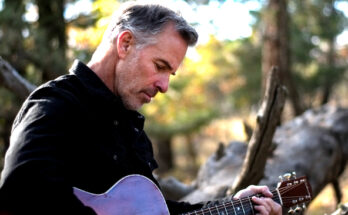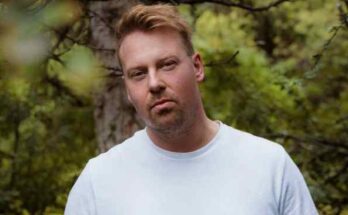Hailing from the shores of Jupiter, Florida, 20-year-old singer-songwriter Lilly Bedard returns with her latest single, “Not Everything Ends,” a heartfelt exploration of love, resilience, and hope. With a unique blend of alternative pop, folk pop, and singer-songwriter influences, Lilly continues to captivate audiences with her evocative melodies and raw, poetic lyricism.
As a full-time college student and student-athlete at Babson College in Boston, MA, Lilly balances the demands of academia and athletics with her passion for music. Growing up inspired by legendary artists like Stevie Nicks and Sheryl Crow, she began writing songs at just 14 years old, using music as a vessel to navigate life’s transitions and emotional landscapes. Her latest offering, “Not Everything Ends,” marks a significant evolution in her artistry, embracing a more introspective and hopeful tone.
What inspired you to write “Not Everything Ends,” and how does it differ from your previous music?
“Not Everything Ends” was inspired by my relationship with my boyfriend, Noah. Noah came into my life at a time where my Dad had gotten very sick, and he was the most incredible support system for me. When a family member is sick, especially someone who you thought was indestructible, it can put you into a headspace that makes you feel like everything around you could be taken away any day. Noah makes me feel a little bit more grounded and safer. I wrote the song about letting go of my fears and letting down my guard with him. I wanted it to feel like letting all the love in after so many years of being afraid. I think a lot of my music released previously was more centered around heartbreak and longing. I love my old music, but I think with every release I am reaching a new level of authenticity in both production and lyricism.
As a full-time college student and student-athlete at Babson College, how do you balance academics, athletics, and your music career?
It’s a lot! Every week looks so different which is really fun honestly, but sometimes it can get incredibly stressful going from class to the studio to practice to homework and repeat. Somewhere in there I like to have a social life too! The actual balancing of it takes a lot of prioritizing and fitting things in here and there in a free 30 minutes, but what keeps me going is that I love all three things so much, and they all influence each other. In my eyes school is for my mind, sports are for my body, and music is for my soul. I wouldn’t be me without all three!
You mention that you’ve been inspired by legendary artists like Stevie Nicks and Sheryl Crow. How have they influenced your music and songwriting style?
Stevie Nicks and Sheryl Crow have definitely shaped the way I approach music, both in songwriting and overall vibe. Stevie’s storytelling, the way she weaves emotions and imagery into her lyrics, has inspired me to be more poetic and raw in my writing. I love how she creates a world within her songs, where emotions feel almost mythical. Sheryl Crow, on the other hand, has this effortless, rootsy, and organic sound that I admire. Her melodies feel timeless, and she balances vulnerability with strength in a way that really resonates with me.
I think both artists have also influenced the way I want my music to feel—there’s a mix of nostalgia, freedom, and a little bit of melancholy in their work that I try to channel. Whether it’s through layered harmonies, conversational lyrics, or a sense of storytelling that feels both deeply personal and universally relatable, they’ve definitely played a role in shaping my sound.
At just 14, you started writing songs. What was it like for you to begin expressing yourself through music at such a young age?
I was an interesting kid for sure, and I had a lotttt of feelings bottled up that needed some kind of outlet. I’ll never forget the feeling of performing the first song I had ever written at my talent show in 8th grade. I remember being so nervous that I could puke as I sat at the piano shaking, everyone’s eyes on me. It was a pretty vulnerable song too, written about my 7th grade ex-boyfriend who happened to be sitting in the audience. If that wasn’t foreshadowing for the rest of my life then I don’t know what is! I think starting so young was a great lesson in getting over the fear of just putting yourself out there. Maybe people will know a song is about them, but at the end of the day it isn’t my story anymore once it’s out in the world. Someone enjoying and relating to my song is enough for me to keep going and stomach the occasional discomfort of being so vulnerable.
Can you walk us through the creative process behind “Not Everything Ends”? How did the song evolve from frustration to completion?
I sat down that night around 10pm to write a love song because I felt such strong feelings of needing to. However, sometimes the feelings aren’t enough to make the song! It ended up taking me until about 1am to get the right chords and flow for it, which was brutal for someone who usually goes to bed at 10pm. It came much easier after writing the song though. Just a week or two later I got into the studio with my boyfriend Noah, and we recorded guitar, drums, and vocals. He played the drums which I thought was just so special for the song. I was in the middle of my music video shoot for “Winter” when I played it to my producer, Cathy Ponce, and she loved the song and wanted to work on it right away. I think we knew we had something beautiful when it all came together with the finishing elements.
You describe this song as a “heartfelt departure” from your usual style. How do you feel about the shift in tone, from your previous work to something more hopeful and introspective?
I spent so long trying to create music for other people. I noticed that acoustic music doesn’t do as well with my peers and isn’t as playable at a party, so a lot of my earlier projects were more upbeat and “listenable” as I used to call it. As I have gotten less worried about what other people think, the production of my music has gotten a lot more authentic. I write all of my songs on the guitar or the piano, and I am discovering that maybe they sound best in that form as well! I’m not going to lie- I feel a little bit nervous that this song has been so popular compared to some of my others, because it means I am going to really try to explore this side of my creativity. Writing about positive topics is uncomfortable for a girl who lives and breathes sad music, but I’m excited to grow as an artist.
How do you approach writing about love, especially considering the vulnerability involved in sharing personal emotions with your audience?
Not writing from a feeling just isn’t fun for me. I love writing about how I feel, a movie I watched, or something a friend is going through—anything outside of that feels like dragging bricks. Lately, I’ve been so in love that writing has come really easily! I try to keep my songs as time capsules—no matter what happens next, they stand as a snapshot of exactly how I felt in that moment. Sometimes, I stop feeling that way just hours after writing. For example, You Ruined This, You Ruined Them is one of the most angsty, heartbreaking songs I’ve ever written, and in the moment, it came out like breathing. A few hours later, I listened back and thought, Oh my gosh, Lilly, you are so dramatic. But honestly, it’s fun for me to let so many people in like that.
You mention the emotional journey of moving from heartbreak to healing in this song. How does your own personal experience shape the way you write songs that connect deeply with listeners?
As a college girl, I’ve experienced so much in such a short time—especially when it comes to being with the wrong people and being mistreated. Love has always been a huge priority for me. I’m such a hopeless romantic and was obsessed with the idea of love from such a young age, which sometimes led me to let the wrong people in and stay in the wrong situations. At a certain point, I felt like I had to give up on finding true, lasting love. And then, suddenly, I had everything I had ever dreamed of. It’s so true that love can heal you. I had never felt unconditional love like I do with Noah, and it changed me for the better in ways I never expected. I feel kinder, happier, and more level-headed. I hope the songs I write about this experience can either give hope to people who feel hopeless or be a space for those who already relate—to sit in that feeling and feel gratitude for this life.
What message or feeling do you hope to convey to listeners through “Not Everything Ends,” especially those who have experienced love after loss?
I hope to convey that there is always more for you on the other side. Your dreams can come true. Good things do happen, even if really bad things happen. Hold onto the good and stay the course!
Looking ahead, how do you see your songwriting evolving, and what can fans expect from you in the future?
I think my songwriting will keep evolving as I grow and experience new things. Right now, I write a lot from personal emotions and experiences, but I’d love to experiment more with storytelling, different perspectives, and new sonic textures. I want to push myself to be even more honest and unfiltered while also exploring more dynamic sounds—maybe blending more folk influences with alternative production or playing around with unexpected structures.
Fans can definitely expect more music that feels raw and personal, but also a bit more daring. I’m excited to take risks, both lyrically and sonically, and really lean into whatever inspires me in the moment. There’s definitely more music coming, more live performances, and hopefully, some collaborations with artists I admire. I just want to keep growing and making music that feels real to me.


